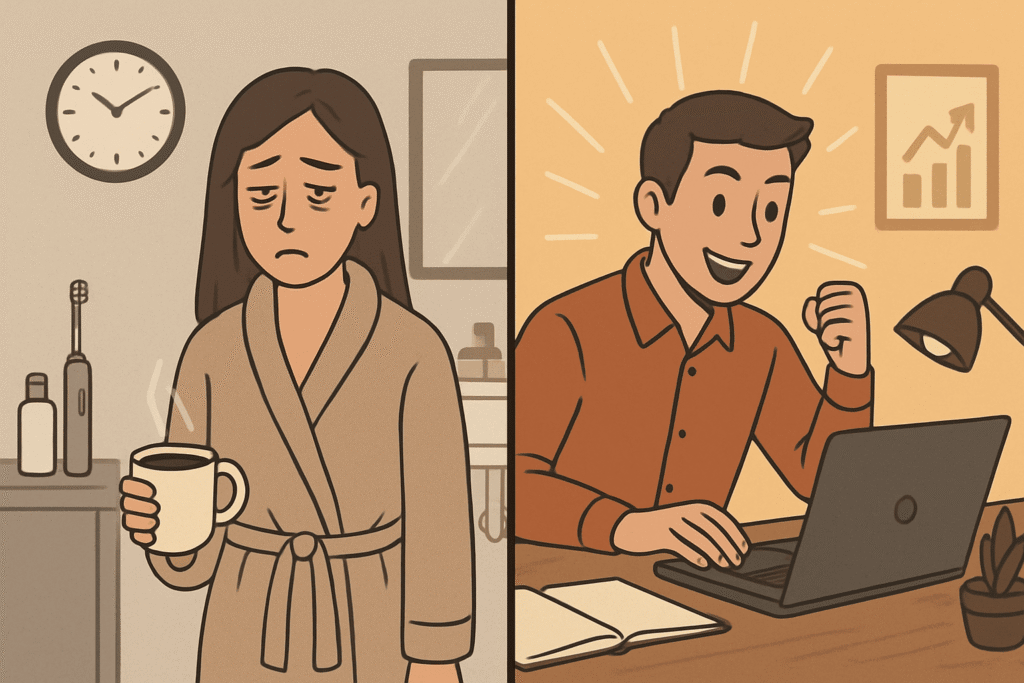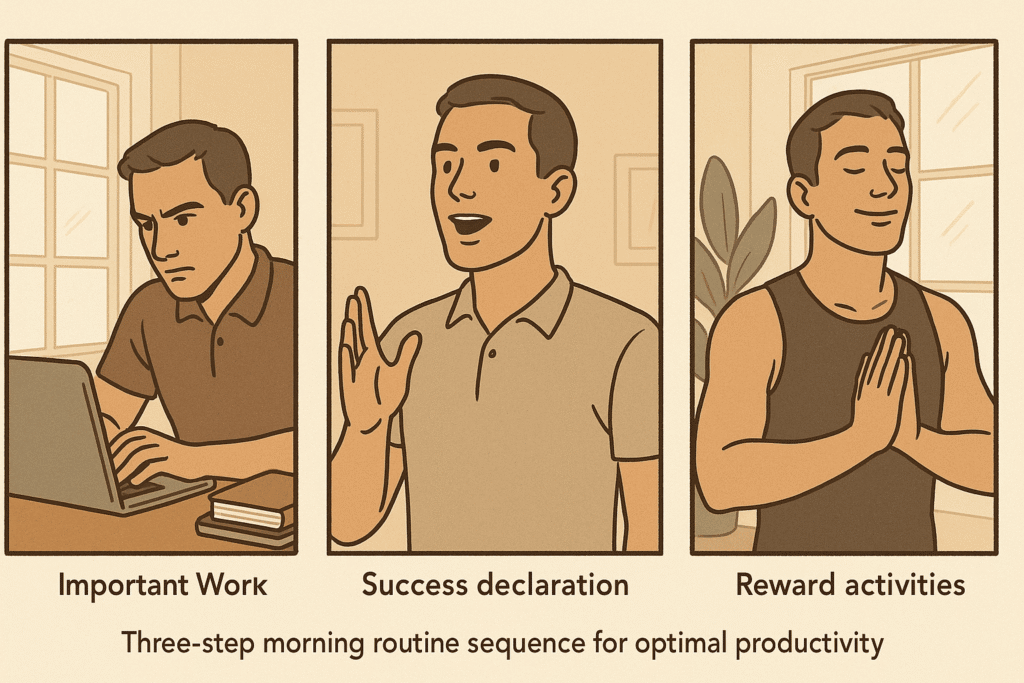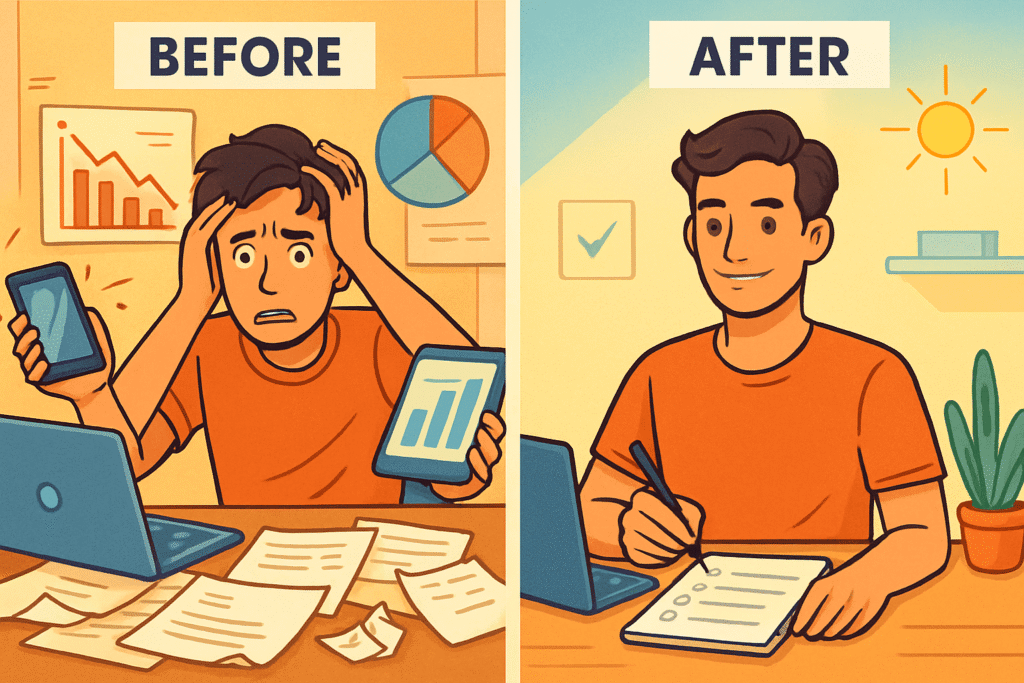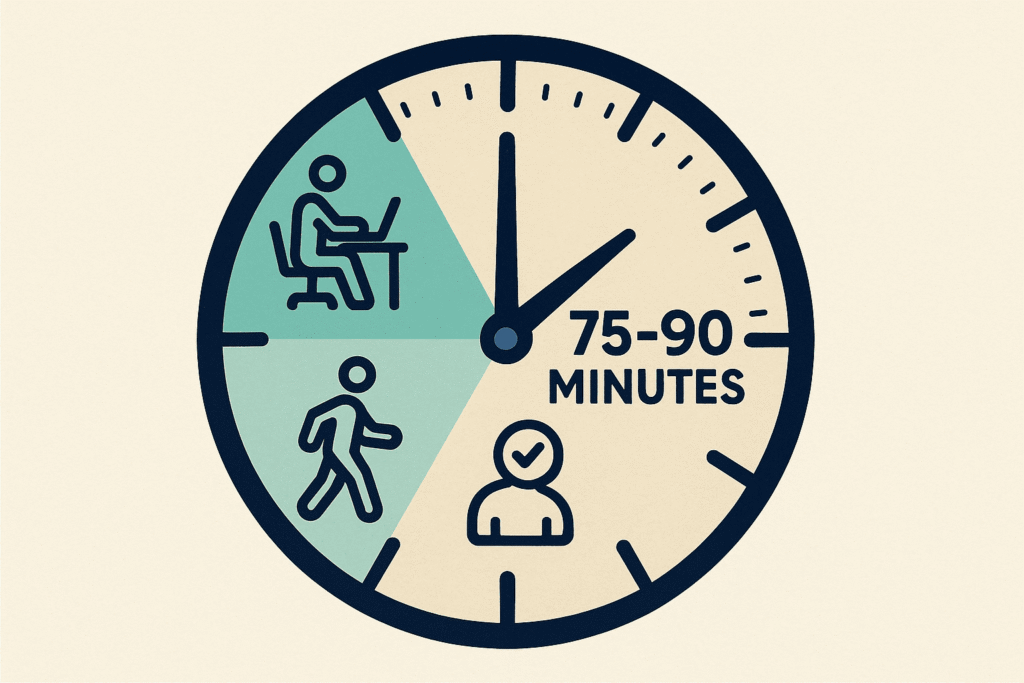Traditional morning routines often consume our peak cognitive hours without proportional returns. Here’s what the science suggests about optimizing your mornings—and a different approach worth testing.
What Time Should You Really Wake Up for Success?
The question isn’t about a specific wake-up time—it’s about aligning with your natural circadian rhythms and cognitive peaks.
Research in chronobiology shows individual differences in peak performance times. A 2019 study in Current Biology found that cognitive performance varies significantly based on chronotype, with “morning larks” showing peak alertness 2-4 hours after waking, while “night owls” peak later in the day¹. Most adults experience their highest levels of cortisol (which enhances alertness) within the first hour of waking, followed by peak cognitive performance 1-3 hours later².
The practical takeaway: Instead of forcing a 5 AM wake-up, identify when your mind feels sharpest—typically 1-3 hours after your natural wake time—and protect that window for demanding cognitive work.
Consider this approach:
- Track your natural energy patterns for one week
- Note when complex thinking feels easiest
- Schedule important work during these windows
- Use less demanding activities (exercise, routine tasks) during lower-energy periods
One approach I’ve observed work well is what I call the “Work First” method: tackling meaningful cognitive work immediately upon achieving mental clarity, then using physical activities and self-care as positive reinforcement.
Note: This contradicts popular advice about elaborate morning rituals, but it’s worth testing if your current routine leaves you feeling behind despite good intentions.

How to Start a Morning Routine That Actually Works?
The challenge with most morning routine advice is that it treats all activities as equally valuable, regardless of cognitive demands.
Neuroscience research suggests our prefrontal cortex—responsible for complex decision-making, creativity, and strategic thinking—operates at peak efficiency when well-rested and before decision fatigue sets in³. A study published in Psychological Science found that people make better decisions and show enhanced creative problem-solving in the morning hours⁴.
The “Work First” approach:
- Upon achieving mental clarity (usually 15-30 minutes after waking)
- Engage in one meaningful work task for 30-90 minutes
- Use traditional morning activities (exercise, meditation, journaling) as rewards
Why this might work better:
- Leverages peak cognitive resources for high-value activities
- Creates immediate progress toward important goals
- Builds positive association with morning productivity
- Leaves energy for family/personal time in evenings
Important caveat: This approach won’t suit everyone. Some people need physical movement or meditation to achieve mental clarity first. The key is experimenting to find what sequence works for your brain and lifestyle.
I’ve seen this approach help various people: a freelance graphic designer who started sketching concepts first thing (leading to her most creative work), a graduate student who wrote thesis sections before classes (completing his research months ahead of schedule), and a working parent who planned business strategies during quiet morning hours (eventually launching a successful side business).

What Are the Best Morning Habits for Busy People?
Rather than prescribing universal habits, research suggests focusing on habit sequencing and cognitive load management.
A comprehensive review in Annual Review of Psychology found that successful habit formation relies more on consistent environmental cues and reward structures than on specific activities⁵. Additionally, research on “ego depletion” suggests that decision-making capacity decreases throughout the day⁶.
Evidence-based sequencing principles:
- Cognitive Work First (when mentally fresh)
- Identity Reinforcement (brief goal affirmation or planning)
- Physical/Mental Restoration (exercise, meditation, or other wellness activities)
This sequence appears effective because:
- It capitalizes on peak cognitive windows
- Creates immediate sense of accomplishment
- Uses feel-good activities as natural rewards
- Builds identity as someone who prioritizes important work
Real-world applications I’ve observed:
- A retired teacher wrote memoir chapters each morning, then rewarded herself with gardening (completed book in 8 months)
- A CEO tackled strategic planning first, then exercised (reported clearer decision-making and reduced evening stress)
- A musician composed new material upon waking, then practiced technique (increased creative output significantly)
Important considerations:
- Some people need movement or caffeine before cognitive work
- Family obligations may require adaptation (earlier wake-up or modified sequence)
- The “cognitive work” should align with your major goals and feel energizing, not draining

Why Do Most Morning Routines Fail After a Few Weeks?
Habit research reveals several common failure patterns, with misaligned cognitive demands being a frequently overlooked factor.
Studies on habit formation show that people overestimate their ability to maintain complex behavioral changes⁷. Additionally, research on “implementation intentions” suggests that routines fail when they don’t account for realistic constraints and natural energy patterns⁸.
Common failure patterns:
- Cognitive misalignment: Using peak mental energy for low-cognitive tasks (making breakfast, checking social media)
- Excessive complexity: Attempting too many changes simultaneously
- Lack of immediate rewards: No positive reinforcement for completing difficult tasks
- All-or-nothing thinking: Abandoning the entire routine after missing one day
The cognitive misalignment problem is particularly interesting. Many morning routines inadvertently waste the brain’s freshest state on routine tasks, leaving complex work for when mental resources are depleted.
A different approach based on cognitive science:
- Identify your most important cognitive work
- Do this during peak mental clarity (usually morning)
- Use routine tasks as breaks between demanding work
- Build in flexibility for imperfect days
I’ve seen people transform their productivity by flipping this sequence. A yoga instructor who struggled with business planning started doing administrative work first thing (before physical practice), leading to better class organization and income growth. A sales professional who moved prospect research to morning hours (instead of evening) saw significant improvement in client relationships.
The key insight: Failed routines often indicate poor task-timing alignment, not lack of willpower.

How Long Should Your Morning Routine Be?
Research on cognitive performance and practical constraints suggests that longer isn’t necessarily better.
Studies on attention spans and deep work indicate that most people can maintain high-level focus for 45-90 minutes before needing a break⁹. Additionally, research on work-life balance shows that sustainable routines must fit within realistic time constraints¹⁰.
Evidence-based timing recommendations:
- 45-90 minutes total for most people
- 60% for cognitive work (30-60 minutes)
- 40% for physical/mental care (15-30 minutes)
Why this duration works:
- Aligns with natural attention spans
- Leaves time for family/other responsibilities
- Prevents routine from becoming burdensome
- Allows for flexibility on busy days
Practical examples:
- 75-minute routine: 45 minutes writing/planning + 30 minutes exercise/meditation
- 60-minute routine: 40 minutes focused work + 20 minutes physical care
- 45-minute minimum: 30 minutes cognitive work + 15 minutes restoration
The research suggests that consistency matters more than duration. A sustainable 45-minute routine practiced daily will likely yield better results than a 2-hour routine practiced sporadically.
I’ve worked with people who reduced elaborate 2-hour morning rituals to focused 75-minute routines and saw improved outcomes: a marketing director who cut her routine in half while completing more strategic projects, and a graduate student who streamlined his morning to focus on thesis writing, leading to earlier graduation.

What Should You Do If You Miss Your Morning Routine?
Perfectionism is one of the biggest routine killers, according to behavioral psychology research.
Studies on self-compassion and habit maintenance show that people who respond to lapses with kindness rather than self-criticism are more likely to resume positive behaviors¹¹. Research on “implementation intentions” also suggests that planning for obstacles improves long-term adherence¹².
The “Next Morning Reset” approach:
- Acknowledge the miss without judgment
- Resume the next available morning
- Don’t attempt to “make up” for lost time
- View lapses as data, not failures
Why this works:
- Prevents all-or-nothing thinking
- Maintains long-term perspective
- Reduces shame-based abandonment
- Builds resilience into the system
The research is clear: People who practice self-compassion while maintaining accountability show better long-term behavior change than those who use self-criticism as motivation.
Real examples of resilience:
- A musician who missed morning songwriting sessions during illness resumed immediately upon recovery, completing an album despite several weeks of interruptions
- A business owner who traveled frequently adapted his routine to hotel rooms and different time zones, maintaining consistency despite schedule disruptions
Key insight: Flexibility and self-compassion aren’t weakness—they’re strategic approaches that improve long-term success rates.

How to Make Your Morning Routine Work for Your Family?
Work-life integration research suggests that successful routines enhance rather than compete with family relationships.
Studies on family dynamics and personal productivity show that parents who maintain personal development practices often model positive behaviors for children while reducing stress in family interactions¹³. The key is designing routines that fit within existing family structures rather than requiring major lifestyle overhauls.
Family-friendly strategies:
- Earlier wake-up by 30-45 minutes (before family activity begins)
- Quiet, non-disruptive activities (reading, writing, planning)
- Flexible adaptation for changing family schedules
- Transparent communication with family members about the routine’s purpose
Why this approach works:
- Models self-care and goal pursuit for children
- Creates personal accomplishment time
- Often improves patience and presence during family time
- Demonstrates that personal growth and family commitment can coexist
Practical applications:
- A working mother used 30 minutes before family wake-up for business planning, leading to a successful side venture while maintaining strong family relationships
- A single father combined early morning coding practice with later family time, growing his freelance business while remaining available for his teenagers
- A teacher used morning writing time to work on a novel, completing the project while still prioritizing family dinners and activities
Important considerations:
- Requires honest assessment of current sleep needs
- May need adjustment during different family life phases
- Should enhance, not strain, family relationships
- Flexibility is essential for long-term sustainability

The Science-Based Bottom Line
The evidence suggests that traditional morning routines often misalign with how our brains actually function best. While individual variations exist, several principles appear consistently in the research:
Key findings:
- Cognitive performance peaks 1-3 hours after waking for most people
- Decision-making capacity decreases throughout the day
- Habit formation succeeds through consistent cues and rewards
- Self-compassion improves long-term adherence more than self-criticism
- Sustainable routines fit within existing life constraints
The “Work First” approach worth testing:
- Identify your peak cognitive window (usually morning)
- Use this time for your most important work
- Follow with physical/mental restoration activities
- Build in flexibility for imperfect days
- Focus on consistency over perfection
Important limitations:
- This approach won’t suit everyone’s chronotype or circumstances
- Some people need movement or meditation before cognitive work
- Family and work obligations may require modifications
- Individual experimentation is essential
For further reading:
- Peak Performance by Brad Stulberg and Steve Magness
- Atomic Habits by James Clear
- Research from the Centre for Time Use Research (Oxford)
- Studies on circadian rhythms from Harvard Medical School
The goal isn’t to revolutionize your entire life overnight, but to experiment with evidence-based approaches that might better serve your specific situation and goals.
References:
- Facer-Childs, E., et al. (2019). Current Biology
- Clow, A., et al. (2010). Psychoneuroendocrinology
- Gailliot, M.T., & Baumeister, R.F. (2007). Current Directions in Psychological Science
- Wieth, M.B., & Zacks, R.T. (2011). Psychological Science
- Gardner, B., et al. (2016). Annual Review of Psychology
- Baumeister, R.F., et al. (1998). Journal of Personality and Social Psychology
- Lally, P., et al. (2010). European Journal of Social Psychology
- Gollwitzer, P.M. (1999). American Psychologist
- Ericsson, K.A., et al. (1993). Psychological Review
- Clark, S.C. (2000). Human Relations
- Breines, J.G., & Chen, S. (2012). Personality and Social Psychology Bulletin
- Sheeran, P., et al. (2005). British Journal of Social Psychology
- Greenhaus, J.H., & Powell, G.N. (2006). Academy of Management Review





